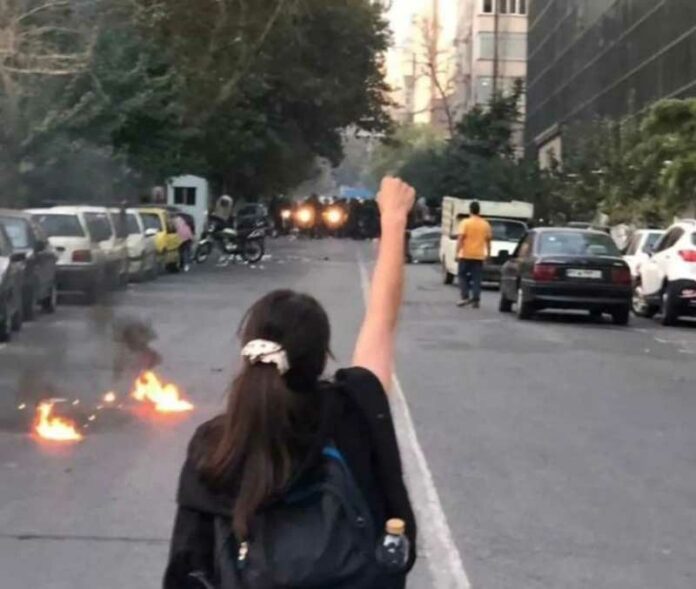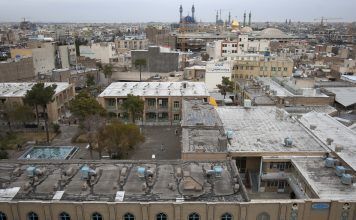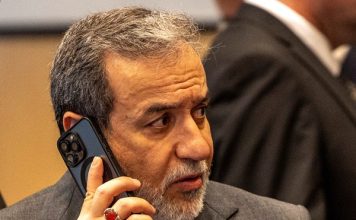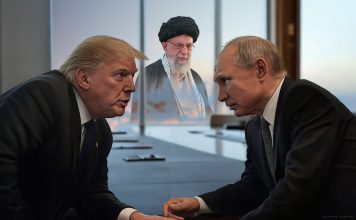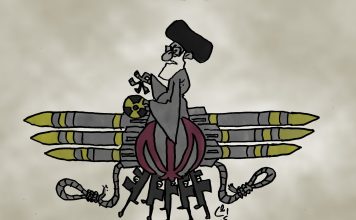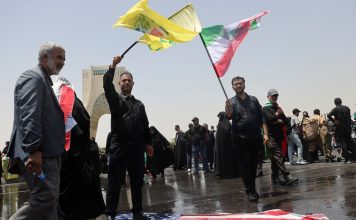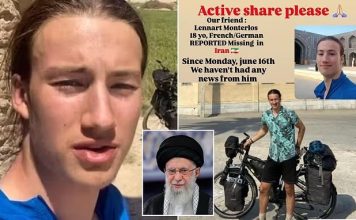By Kayhan Life Staff
Execution of ordinary citizens, whose only crime is to demand their inalienable civic, legal, and human rights, has been the Islamic Republic’s method of choice to silence protests in the past four decades.
Iranian authorities have once again resorted to extreme measures to crush the recent nationwide protest sparked by the death of Mahsa (Zhina) Amini, a 22-year-old woman, who died while in the custody of the morality police on Sept. 16 in Tehran.
Security forces, riot police, and the plainclothes Basij (volunteer militias) have failed to prevent people from pouring into the streets in the past two and a half months, despite their brutal treatment of protesters.
Authorities have charged many of those arrested with “spreading corruption on earth” and “waging war against God,” paving the way for the Judiciary and judges to issue death sentences. Several defendants who might receive death sentences are younger than 18 years old.
ANALYSIS: How Iranian Protesters Unmasked The Regime’s Old Game Of Divide And Rule’
The alarming development has prompted the determined protesters to add “This is the final message: executions will spark a revolt” to their list of revolutionary and anti-Islamic Republic slogans.
According to the Iranian state media, Judge Musa Asef-Alhosseini of Branch-1 of Karaj Revolution Court, in the northern province of Alborz, began trial proceedings on Nov. 30 for 15 protesters accused of killing and aiding in the murder of Ruhollah Ajmian, a member of the Basij forces. Three of the defendants in the case are 17 years old.
The charges listed in the indictment, issued by the Alborz Province Prosecutor’s Office, included “spreading corruption on earth through repeated acts against national security” and “attacking members of the Basij and FARAJA [the Law Enforcement Command of the Islamic Republic of Iran] forces” and “assembly and collusion to commit acts against national security.”
The prosecutor asked the court to give all 15 defendants maximum punishment based on “medical examiners’ findings, recreation of the crime scene, defendants’ comments and confessions to the crime, seizing incriminating evidence from the defendants, and retrieving incriminating texts from the defendants’ mobile phones.”
Under Islamic Republic law, the crime of “spreading corruption on earth,” which is only one of the charges filed against all 15 defendants, is punishable by death.
There are unconfirmed reports on social media about the execution of Mehdi Karami, one defendant in the case. However, Iranian authorities and sources close to Mr. Karami’s family have not confirmed those reports.
Ruhollah Ajmian, born on Feb. 9, 1995, was a member of the Basij unit 417 of Kamalshahr in Karaj. He was killed on Nov. 3 during the closure of the Karaj-Ghazvin highway. Authorities had reportedly closed the highway to control a massive protest held at Karaj’s Behesht Sakineh cemetery on the 40th day of mourning for Hadis Najafi, a 22-year-old woman who was shot dead on Sept. 21 in Mehrshahr.
Two days later, Alborz Province Prosecutor, Hossein Fazeli-Harikandi, claimed that authorities had arrested the culprits in the murder of a Basij member. He said the perpetrators had used a “knife, baton, brass knuckles, and rocks to commit the murder.”
On Nov. 12, Mr. Fazeli-Harikandi said that his office charged 11 people, including one woman, with “spreading corruption on earth.” However, 15 people were on trial on Nov. 13. Authorities have given no information on the other four defendants in the case.
The trial in Karaj is one of several court hearings held across the country for protesters charged with serious crimes of “waging war against God” and “spreading corruption on earth.”
According to the Human Rights Activists News Agency (HRANA), 459 people have died since the start of the protests, including 64 children and 61 members of the riot police, security units, and Basij forces.
Iranian authorities have released no information about the exact number of those who have lost their lives, been injured, or been arrested.
Meanwhile, the commander of the Aerospace Force of the Islamic Revolutionary Guard Corps (IRGC), Brigadier General Amir Ali Hajizadeh, put the number at “300 dead and martyred”, grouping protesters and security personnel who have lost their lives since the start of the protests.
The Islamic Republic is using the threat of execution as a deterrent to dissuade people from pouring into the streets. The regime has used this extreme approach to silence dissent in the past four decades.
Others who have been charged with “spreading corruption on earth” and “waging war against God” include prominent Iranian rap artist Toomaj Salehi, who is being tried in Isfahan, the capital of the central province of Isfahan, and champion swimmer Parham Parvari, who is being tried in the Tehran Revolution Court.
The Iranian Judiciary’s Mizan Online News Agency reported on Nov. 16 that three people arrested during the latest protests had been sentenced to death.
Some human rights groups have said that several courts across Iran have sentenced at least 20 people to death, following a letter by 227 Majlis (Iranian Parliament) deputies in October urging the Judiciary to convict protesters of “waging war against God” and hand them the maximum penalty.
After the media reported the letter, many Majlis deputies rushed to deny it existed.
In comments reported by the Entekhab News Site on Nov. 13, Hojatoleslam Hossein Jalali, a member of the Majlis’ Cultural Committee, said: “I signed a letter, but heard there was a second fake letter signed by deputies and others who are not in the parliament and published outside the Majlis.”
When asked about the letter that he had signed, Mr. Jalali explained: “In this letter, deputies urged the Judiciary to exact Qisas [retaliation in kind, or retributive justice], in line with Islamic laws, from those who have committed ‘intentional homicide,’ and killed security personnel. We have signed no other letter.”
Sometimes prosecutors charge a suspect with “intentional homicide,” enabling the court to sentence the person to death, as with Navid Afkari, a 27-year-old Iranian champion wrestler who was executed on Sept. 12, 2020, in Shiraz, the capital of the southwestern Fars province.
Mr. Afkari was charged with murdering a security guard at the Shiraz Water and Wastewater Management Company during the nationwide protests of 2018. He was hanged hurriedly and secretly without prior notice to him, his family, or his lawyer.
Iranian Jiu-Jitsu Champion Rajabi Dedicates Win to Executed Wrestler Afkari
Iranians are acutely aware of this tactic used by the authorities to expedite the executions of prisoners and protesters. The alarming trend prompted protesters in Ekbatan Town, in western Tehran, to shout, “this is the last message; executions will spark a revolt,” on Nov. 30.
The UN Special Rapporteur on the situation of human rights in the Islamic Republic of Iran, Javaid Rehman, recently voiced concerns about the Islamic Republic’s “campaign” of sentencing protesters to death.
Iranian State-Organised Marchers Call for Execution of Protesters
Horrific Video of a Protester Executed by Gunshot in Iran Goes Viral
In an interview with the Reuters news agency on Nov. 29, Mr. Rehman said: “I’m afraid that the Iranian regime will react violently to the Human Rights Council [OHCRC] resolution, and this may trigger more violence and repression on their part.”
On Nov. 24, the OHCRC established an “independent, international fact-finding mission to thoroughly and independently investigate alleged human rights violations in Iran related to the protests that began on Sept.16.”
The OHCRC’s resolution on “the deteriorating human rights situation in the Islamic Republic of Iran, especially concerning women and children,” was adopted with 25 voting in favor, six against, and 16 abstentions.
“Now [authorities] have started a campaign of sentencing [protesters] to death,” Rehman told Reuters. “Already, 21 people arrested in the protests face the death penalty, including a woman indicted on ‘vague and broadly planned’ criminal offenses, and six have been sentenced this month.”
“Islamic Republic authorities have reported death sentences being issued against protesters, some of which have even been upheld by the Supreme Court. At least three children are also facing death penalty charges,” the Norway-based Iran Human Rights (IHRNGO) warned in a statement on Nov. 30.
“Recalling the Islamic Republic’s history of using the death penalty as a tool of repression and intimidation, IHRNGO warns of the serious risk of their imminent executions and calls on countries with diplomatic relations with the Islamic Republic to do what they can to stop the execution of protesters,” it added.
IHRNGO director Mahmood Amiry-Moghaddam said: “Protesters are being sentenced to death in show trials without access to their lawyers and due process. These sentences have no legal validity. The people of Iran and the international community must send a strong message that the execution of protesters will not be tolerated.”
IHRNGO published the name of 11 protesters who could face the death penalty if convicted, including Manouchehr Mehmannavazi, Mohammad Ghobadlou, Saman Seyyedi (Yassin), Saeed Shirazi, Mohsen Rezazadeh Gharagholu, Mohammad Boroughani, Abolfazl Mehri Hossein Hajilu, Mahan Sadarat-Madani, Sahand Nour Mohammadzadeh, Majid Rahnavard, and Toomaj Salehi.
On Nov. 30, Iran’s Supreme Court upheld the death penalty for four men convicted of “collaborating with Israel.”
“The defendants, Hossein Ordukhanzadeh, Shahin Imani Mahmoudabad, Milad Ashrafi Atbatan, and Manouchehr Shahbandi Bejandi were sentenced to death for destroying private and public property, kidnappings, and extracting a false confession,” Mizan Online News Agency reported, citing a statement issued by the Judiciary.
On May 24, the IRGC said it had arrested members of a “network” working under the “guidance” of the “Israeli intelligence” service. The case could be related to a story reported by several Israelis during the same time, alleging that the Mossad spy agency had questioned Mansour Rasouli, an IRGC member, at his house in Iran.
ANALYSIS: Iranian Protesters Use New Tactics to Defy Security Forces
Mr. Rasouli allegedly confessed to being involved in a plan to assassinate an Israeli diplomat at the Israeli consulate in Istanbul, an American general stationed in Germany, and a journalist in France.
However, Rasouli later denied all allegations, saying he was tortured and forced into a false confession.
The Islamic Republic has convicted several people of spying for foreign governments and executed them, releasing no information about the charges, trials, and executions of these individuals.
Expedient executions of the accused without due process have become the Islamic Republic’s method of choice to eliminate opposition and silence dissent.
According to the Iranian state media, the Judiciary has sentenced three other people to “between five to 10 years for acting against the national security, complicit in kidnapping, and possession of weapons.” The Judiciary has not released the names of the three individuals.

